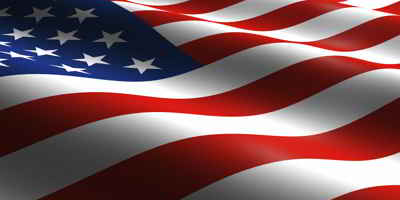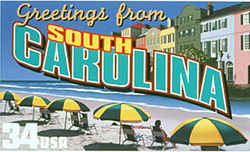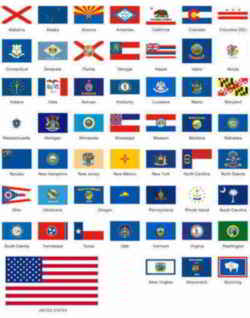

South Carolina Symbols
South Carolina
State Flag
Adopted on January 28, 1861.
The flag of the state of South Carolina has, in some form, existed since 1775, being based on one of the first Revolutionary War flags.
The General Assembly adopted the current version of South Carolina's flag on January 28, 1861. This version added the Palmetto tree to the original design by Colonel William Moultrie in 1775 for use by South Carolina troops during the Revolutionary War. Colonel Moultrie chose a blue color which matched the color of their uniforms and a crescent which reproduced the silver emblem worn on the front of their caps. The palmetto tree was added later to represent Moultrie's heroic defense of the palmetto-log fort on Sullivan's Island against the attack of the British fleet on June 28, 1776.
The South Carolina State Flag
The Moultrie Flag
In 1775, Colonel William Moultrie was asked by the Revolutionary Council of Safety to design a flag for the South Carolina troops to use during the American Revolutionary War. Moultrie's design had the blue of the militia's uniforms and the crescent.
This flag was flown in the defense of a new fortress on Sullivan's Island, when Moultrie faced off against a British fleet that hadn't lost a battle in a century.
On June 28, 1776, the flag was shot down, but Sergeant William Jasper ran out into the open, raising it and rallying the troops until it could be mounted again. This gesture was so heroic, saving Charleston, South Carolina, from conquest for four years, that the flag came to be the symbol of the Revolution, and liberty, in the state and the new nation.
Soon the Moultrie Flag or Liberty Flag, it became the standard of the South Carolina militia, and was presented in Charleston, by Major General Nathanael Greene,when that city was liberated at the end of the war. Greene described it as having been the first American flag to fly over the South.
Succession: National Flag
South Carolina needed a national flag after it seceded from the Union on December 20, 1860. The General Assembly considered a wide range of designs, but on January 28, 1861, added the palmetto to Moultrie's original design, thereby officially creating the flag as we know it today. The palmetto tree was added in 1861, also a reference to Moultrie's defense of Sullivan Island; the fortress he'd constructed had survived largely because the palmetto trees, laid over sand walls, were able to withstand British cannons. A resolution proposing changing the color to "royal purple" as a memorial to the Confederate dead was resoundingly defeated in 1899, leaving the flag's Revolutionary War symbolism intact.
By statute the flag shall be displayed "upon the inside of every public school building in this State so that all school children shall be instructed in proper respect for the flag," and daily except in rainy weather, from a staff upon the State House and from a staff upon each County Courthouse. The State Flag is also to be displayed in accordance with rules set by the State Superintendent of Education, on the grounds of educational institutions supported in whole or part, by funds derived from the State. It is also prescribed that any person who mutilates, injures or desecrates the State Flag, wherever displayed, shall be guilty of a misdemeanor, punishable by a fine of not more than $100 or by imprisonment for not more than 30 days or both.
The state military crest, which is the crest used in the coats of arms of units of the National Guard, as granted by the precursor organizations of what is now the Army Institute of Heraldry. The official Institute of Heraldry blazon is "Upon a mount vert a palmetto tree proper charged with a crescent argent."
South Carolina Flag Law
South Carolina Code of Laws, Titles 1, 4, 10, and 59.
TITLE 1. ADMINISTRATION OF THE GOVERNMENT
CHAPTER 1. GENERAL PROVISIONS
ARTICLE 9. STATE EMBLEMS, PLEDGE TO STATE FLAG, OFFICIAL OBSERVANCES
SECTION 1-1-670. Official pledge to State flag.
The pledge to the flag of South Carolina shall be as follows:
"I salute the flag of South Carolina and pledge to the Palmetto State love, loyalty and faith."
TITLE 1. ADMINISTRATION OF THE GOVERNMENT
CHAPTER 10. REMOVAL AND PLACEMENT OF CONFEDERATE FLAG
SECTION 1-10-10. Flags authorized to be flown atop State House dome, in chambers
of Senate and House of Representatives and on grounds of Capitol Complex; members' offices
as "chambers"; private individual wearing, carrying or displaying flag on capitol
grounds.
(A) As of 12:00 noon on the effective date of this act, and permanently thereafter, the only
flags authorized to be flown atop the dome of the State House, in the chambers of the Senate
and House of Representatives, and on the grounds of the Capitol Complex shall be as authorized
in this section.
The flags authorized to be flown atop the dome of the State House and in the chambers of the
Senate and House of Representatives are the United States Flag and the South Carolina State
Flag. As of 12:00 noon on the effective date of this act, the flag authorized to be flown at
a designated location on the grounds of the Capitol Complex is the South Carolina Infantry
Battle Flag of the Confederate States of America [the Battle Flag of the Army of Northern Virginia
(General Robert E. Lee's Army) the South Carolina, Georgia, Florida Department version]. This
flag must be flown on a flagpole located at a point on the south side of the Confederate Soldier
Monument, centered on the monument, ten feet from the base of the monument at a height of thirty
feet. The flagpole on which the flag is flown and the area adjacent to the monument and flagpole
must be illuminated at night and an appropriate decorative iron fence must be erected around
the flagpole.
The South Carolina Infantry Battle Flag of the Confederate States of America is square measuring
fifty-two inches on each side, inclusive of the white border, with a St. Andrews Cross of blue,
edged with white, with thirteen equal five-pointed stars, upon a red field, with the whole
banner bordered in white. The blue arms of the cross are 7.5 inches wide and the white border
around the flag proper is 1.5 inches wide. The stars are five-pointed, inscribed within a circle
six inches in diameter, and are uniform in size.
From any funds appropriated to the Budget and Control Board, the Division of General Services
of the Budget and Control Board, or its successor in interest, shall ensure that the flags
authorized above shall be placed at all times as directed in this section and shall replace
the flags at appropriate intervals as may be necessary due to wear.
(B) The provisions of this section may only be amended or repealed upon passage of an act which
has received a two-thirds vote on the third reading of the bill in each branch of the General
Assembly.
(C) The term "chambers" of the House or Senate for the purposes of this section does
not include individual members' offices. The provisions of this section do not prohibit a private
individual on the capitol complex grounds from wearing as a part of his clothing or carrying
or displaying any type of flag including a Confederate Flag.
SECTION 1-10-20. Confederate Flags from above rostrums of Senate and House
of Representatives chambers to be placed and displayed in State Museum.
The actual Confederate Flags (Naval Jack) removed from above the rostrum in the chambers of
the House of Representatives and the Senate must be placed and permanently displayed in a suitable
location in the State Museum.
SECTION 1-10-30. Confederate Flag from dome to be placed and displayed in
State Museum.
The actual Confederate Flag (Naval Jack) which is flying on the effective date of this act
and which is removed from the dome of the State House must be placed and permanently displayed
in a suitable location in the State Museum.
TITLE 4. COUNTIES
CHAPTER 17. BUILDINGS AND LANDS GENERALLY
SECTION 4-17-40. State flag shall be displayed on courthouse.
The State flag shall be displayed daily, except in rainy weather, from a staff upon every courthouse.
The officer in charge of each courthouse shall purchase a suitable flag and cause it to be
displayed, the expense to be borne out of the funds provided for maintenance of the courthouse.
TITLE 10. PUBLIC BUILDINGS AND PROPERTY
CHAPTER 1. GENERAL PROVISIONS
SECTION 10-1-160. Display of certain flags.
(A) The United States flag and the State flag shall be flown daily, except in rainy weather,
from a staff upon the State House, and shall be displayed above the rostrum in the chambers
of the House of Representatives and the Senate and in the first floor north foyer of the State
House. No other flag shall be displayed in these locations or atop the dome or roof, or within
the foyers or common or public areas within the capitol building. The State Budget and Control
Board shall purchase suitable flags for display at the State House locations and cause them
to be displayed, the expense to be borne out of the funds appropriated to it.
(B) The provisions of this section may only be amended or repealed upon passage of an act which
has received a two-thirds vote on the third reading of the bill in each branch of the General
Assembly.
(C) The term "chambers" of the House or Senate for purposes of this section does
not include individual members' offices. The provisions of this section do not prohibit a private
individual on the capitol complex grounds from wearing as a part of his clothing or carrying
or displaying any type of flag including a Confederate Flag.
TITLE 59. EDUCATION
CHAPTER 101. COLLEGES AND INSTITUTIONS OF HIGHER LEARNING GENERALLY
ARTICLE 1. GENERAL PROVISIONS
SECTION 59-101-100. Display of United States and State flags.
The State Superintendent of Education shall make such rules and regulations, not inconsistent
with the National Flag Code, for the display of the flag of the United States of America and
the display of the State flag on the grounds of educational institutions supported, in whole
or in part, by funds derived from this State. The person at the head of any educational institution
in the State shall display the flag of the United States of America and the State flag on the
grounds of educational institutions supported, in whole or in part, by funds derived from this
State. The person at the head of any educational institution in the State shall display the
flag of the United States of America and the State flag at such times and at such places and
under such restrictions and rules as he may be directed to observe by the State Superintendent
of Education.
SECTION 59-101-110. Display of State flag on buildings of State University and State
colleges.
The State flag shall be displayed daily, except in rainy weather, from a staff upon one building
of the University of South Carolina and of each State college. The officer or officers in charge
of such buildings shall purchase suitable flags and cause them to be displayed, the expense
to be borne out of the funds provided for maintenance.

The Flags of the US.





